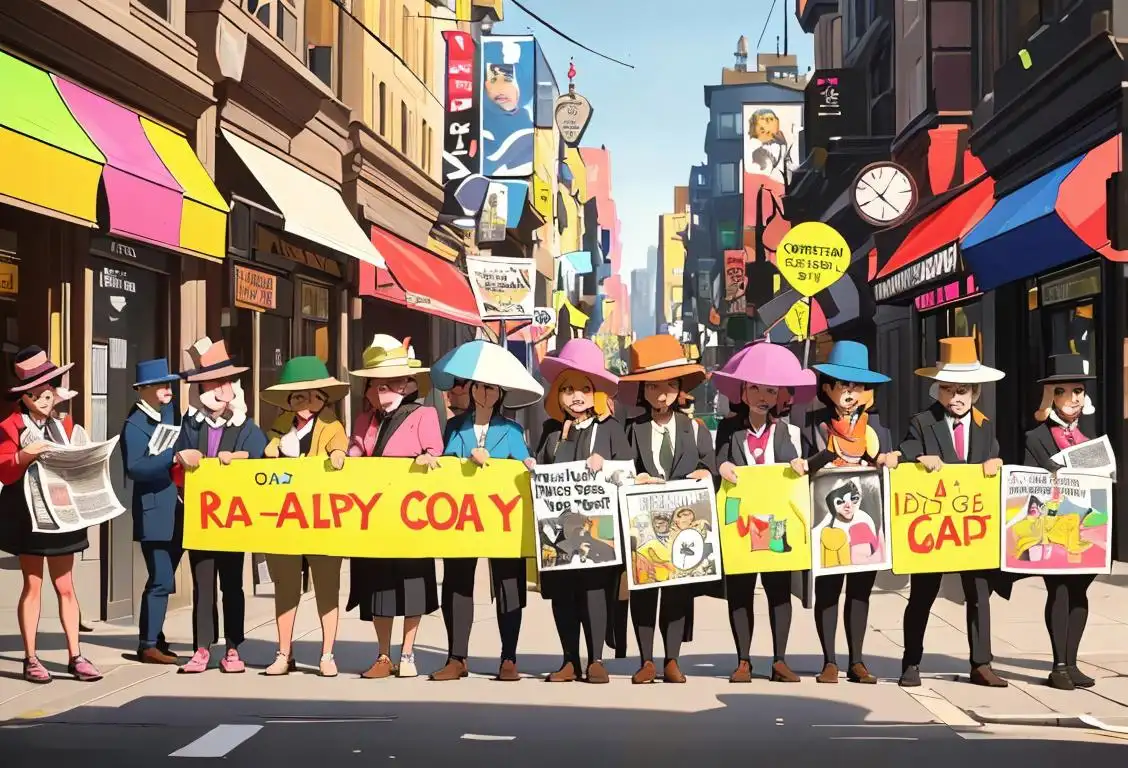National Newspaper Boycott Day

Welcome to the quirky world of National Newspaper Boycott Day! Get ready to put on your activist hats and wave goodbye to newspapers for a day. This is your chance to make a statement and take a break from all those words printed on paper. Let's dive into the fascinating history of this unique national day!
When is Newspaper Boycott Day?
It's national newspaper boycott day on the 26th May.
The Origin of National Newspaper Boycott Day
Did you know that the first official National Newspaper Boycott Day was celebrated on the auspicious date of 26th May 2020? It all began as a fun way to raise awareness about the influence of the mass media and the power of our choices as consumers.
Since the birth of the internet, traditional newspapers have faced tough competition. With news accessible at our fingertips, many people started questioning the accuracy and biases of traditional media sources. National Newspaper Boycott Day emerged as a way to encourage people to explore alternative sources of information and take a break from the constant flow of news offered by newspapers. It's a day to pause, reflect, and perhaps discover new ways of consuming news.
How to Celebrate National Newspaper Boycott Day
On this special day, you have the chance to take a break from the ink-stained pages of newspapers and explore different sources of news. You could:
- Turn off your TV and radio news
- Unsubscribe from printed newspapers for the day
- Explore digital news platforms
- Follow independent journalists and bloggers on social media
- Engage in critical thinking about the news you consume
By participating in National Newspaper Boycott Day, you are promoting media literacy and supporting alternative voices in the information landscape.
A Fun Fact About National Newspaper Boycott Day
Did you know that one of the earliest documented boycotts of newspapers dates back to the 1770s? During the American Revolutionary War, patriots boycotted newspapers that were perceived as loyal to the British crown. This historical example shows that the act of boycotting newspapers has a long and storied past!
History behind the term 'Newspaper Boycott'
1885
The birth of newspaper boycott
The term 'newspaper boycott' first emerged in 1885. It refers to the act of intentionally avoiding the purchase or reading of a particular newspaper as a form of protest or disagreement with its content, policies, or editorial stance. This method of expressing displeasure towards a newspaper quickly gained traction as a means for the public to voice their dissent or objection.
1896
The rise of political boycotts
In 1896, newspaper boycotts became increasingly associated with political campaigns. This tactic was often used during election seasons to pressure newspapers into altering their coverage or editorial positions. Political groups and activists would actively encourage their supporters to refrain from buying or endorsing newspapers that did not align with their political agenda. By boycotting these publications, they aimed to exert influence and promote alternative sources of information.
1920
Mass boycott movements
The 1920s witnessed the emergence of large-scale newspaper boycott movements. Various social and cultural groups, including labor unions, civil rights activists, and women's suffrage campaigners, organized boycotts to challenge newspapers that they perceived as biased, discriminatory, or unwilling to cover important issues. These mass boycott movements served as a powerful tool to draw attention to the concerns and demands of marginalized communities, prompting newspaper publishers to reconsider their practices.
1950
Consumer-driven boycotts
During the 1950s, newspaper boycotts evolved to include consumer-driven initiatives. In response to controversial newspaper articles or unethical practices, individuals and grassroots organizations began advocating for the boycott of specific publications. These boycotts aimed to hit newspapers financially by mobilizing consumers to abstain from purchasing or subscribing to newspapers that they deemed untrustworthy, sensationalist, or lacking journalistic integrity.
Present
Expanding boycotts in the digital age
Today, the term 'newspaper boycott' has expanded its reach beyond print media to encompass online newspapers and news websites. With the advent of the internet and social media, boycott movements can quickly gain global visibility, allowing individuals worldwide to express their dissatisfaction with news organizations. Moreover, online platforms offer unprecedented opportunities for collective action, ensuring that boycotts remain a potent tool for holding media outlets accountable and advocating for more accurate, unbiased, and responsible journalism.
Did you know?
Did you know that one of the earliest documented boycotts of newspapers dates back to the 1770s during the American Revolutionary War?Tagged
awareness funFirst identified
26th May 2020Most mentioned on
26th May 2020Total mentions
163Other days
Nurses Day
Former Prisoner Of War Recognition Day
Press Day
Handloom Day
Heroes Day
Memorial Day
Dance Day
Bestfriends Day
Liberation Day
Love Your Pet Day









